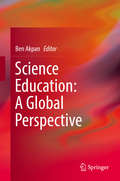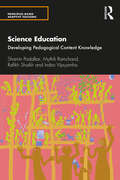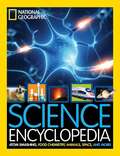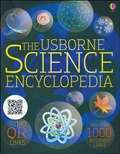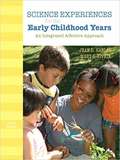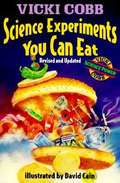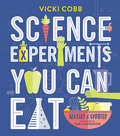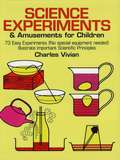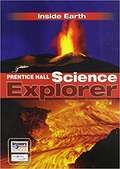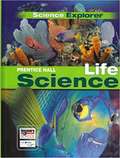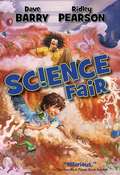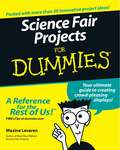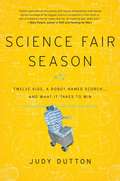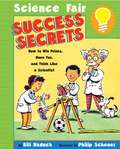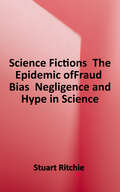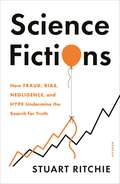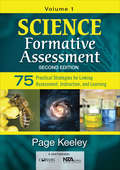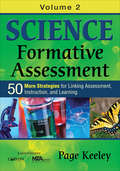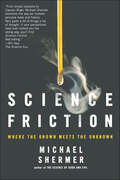- Table View
- List View
Science Education: A Global Perspective
by Ben AkpanScience Education: A Global Perspective is 'global' both in content and authorship. Its 17 chapters by an assemblage of seasoned and knowledgeable science educators from many parts of the world seek to bring to the fore current developments in science education and their implications. The book thus covers a wide range of topics in science education from various national and international perspectives. These include the nature of science, science and religion, evolution, curriculum and pedagogy, context-based teaching and learning, science and national development, socially-responsible science education, equitable access for women and girls in science and technology education, and the benefits of science education research. It ends on an optimistic note by looking at science education in 50 years' time with a recommendation, among others, for stakeholders to take the responsibility of preparing children towards a blossoming science education sector in an anticipated future world. This book is suitable for use by discerning researchers, teachers, undergraduate and postgraduate students in science education, and policy makers at all levels of education. Other educationalists and personnel in science and technology vocations will also find it interesting and useful as the reader-motivated approach has guided the presentation of ideas. Science Education: A Global Perspective is a rich compendium of the components of science education in context, practice, and delivery. Dr Bulent Cavas, Professor of Science Education, Dokuz Eylul Univerity, Buca-Izmir, Turkey/President-Elect, International Council of Associations for Science Education (ICASE) This book will be of immense relevance for current and future global strides in training and research in science education. Surinder K. Ghai, Chairman, Sterling Publishers Pvt. Ltd. , New Delhi, India This book provides a refreshing insight into the current status and future direction of science education. It will be very useful to researchers, those pursuing undergraduate and post-graduate courses in science education, and all other personnel involved in the policy and practice of science education. Dr. Bennoit Sossou, Director/Country Representative, UNESCO Regional Office in Abuja, Nigeria
Science Education: Developing Pedagogical Content Knowledge (Principles-based Adaptive Teaching)
by Shamin Padalkar Mythili Ramchand Rafikh Shaikh Indira VijaysimhaThe book presents key perspectives on teaching and learning science in India. It offers adaptive expertise to teachers and educators through a pedagogic content knowledge (PCK) approach. Using cases and episodes from Indian science classrooms to contextualise ideas and practices, the volume discusses the nature of science, and aspects of assessments and evaluations for both process skills and conceptual understanding of the subject. It examines the significance of science education at school level and focuses on meaningful learning and development of scientific and technological aptitude. The chapters deal with topics from physics, chemistry and biology at the middle- and secondary-school levels, and are designed to equip student-teachers with theoretical and practical knowledge abilities about science, science learning and the abilities to teach these topics along with teaching. The book draws extensively from research on science education and teacher education and shifts away from knowledge transmission to the active process of constructivist teaching-learning practices. The authors use illustrative examples to highlight flexible planning for inclusive classrooms. Based on studies on cognitive and developmental psychology, pedagogical content knowledge of science, socio-cultural approaches to learning science, and the history and philosophy of science, the book promotes an understanding of science characterized by empirical criteria, logical arguments and sceptical reviews. With its accessible style, examples, exercises and additional references, it will be useful for students and teachers of science, science educators, BEd and MEd programmes for education, secondary and higher secondary school teachers, curriculum designers and developers of science. It will interest research institutes, non-governmental organisations, professionals and public and private sector bodies involved in science outreach, science education and teaching and learning practices.
Science Encyclopedia (Encyclopedias)
by National Geographic KidsFood chemistry, atom crashing, wave power, food chemistry, and robots! These are just a few of the topics covered in this fantastic new science encyclopedia, which presents a comprehensive overview of physical and life sciences from A to Z. Super smart and kid-friendly, it’s packed with full-color photographs, weird but true facts, amazing statistics, do-it-yourself experiments, plus profiles of scientists and National Geographic's explorers who rock the world of science. Keep up with the changes happening all around us with this stellar science reference book.
Science Encyclopedia (Science Encyclopedia Series)
by Alastair Smith Laura Howell Kirsteen RogersThis is a comprehensive science reference book covering key topics from gravity, flight and floating to genes and DNA, with clearly written explanations and superb photographs and illustrations. <P><P>With a glossary of 1,500 scientific terms, as well as key dates and biographies of scientists and inventors, and 140 simple experiments for young scientists (children) to try at home.
Science Experiences for the Early Childhood Years: An Integrated Affective Approach
by Jean Harlan Mary Rivkin<p>A classic in the field, this text takes an integrated approach to science without watering it down, and emphasizes understanding and addressing children's affective nature. It remains a forward-thinking, innovative resource for teaching science to young learners, and a best-selling resource for the field. <p>Clearly organized, the text provides a research-based rationale for early science education in Part I chapters. Emphasizing that meaningful science for young children builds on the emotional underpinnings of their curiosity and concerns about the everyday world, and their pleasure in exploring it, this resource encourages new teachers to help children live appreciatively and thoughtfully on Earth. <p>The topical chapters in Part II offer solid, accessible, concept-based activities and are concurrent with the vision of the new Framework for K-12 Science Education, being developed by the Board on Science Education of the National Academy of Science. For each unit presented, students are provided with all the comprehensive integrating and connecting elements to strengthen children's learning of science. Early educators' own content and pedagogical knowledge will be expanded as they practice using the units in class and in field placements.</p>
Science Experiments You Can Eat
by Vicki Cobb Peter LippmanExperiments with food demonstrate various scientific principles and produce an eatable result. Includes fruit drinks, grape jelly, muffins, chop suey, yogurt, and junket.
Science Experiments You Can Eat
by Vicki Cobb Tad CarpenterWith revised and updated material, a brand-new look, and hours of innovative, educational experiments, this science classic by award-winning author Vicki Cobb will be devoured by a whole new generation of readers!Kids take the reins in the kitchen with this hands-on book of edible science experiments! With contemporary information that reflects changes in the world of processing and preserving foods, this cookbook demonstrates the scientific principles that underpin the chemical reactions we witness every day--just by cooking. And once readers have tested their theories and completed their experiments, they can feast on the results! From salad dressing to mayonnaise, celery to popcorn, and muffins to meringues, this book uses food to make science accessible to a range of tastes. Also included is essential information on eating healthfully, plus additional resources for further exploration.
Science Experiments and Amusements for Children
by Charles VivianSeventy-three easy experiments -- requiring only materials found at home or easily available, such as candles, coins, steel wool, etc. -- illustrate basic phenomena like vacuum, simple chemical reactions, and more. All safe. Modern, well-planned.
Science Explorer (Oklahoma Edition)
by Michael J. PadilloOklahoma's Priority Academic Student Skills (PASS) for Science tell you about the inquiry skills and science content you are expected to learn in each grade. You will see on the next several pages that the PASS standards cover Science Processes and Inquiry, Physical Science, Life Science, and Earth/Space Science.
Science Explorer (Virginia Edition, Grade #6)
by Michael J. Padilla Ioannis Miaoulis Martha CyrA science book that explores and details on: Matter and the Environment Earth's Changing Surface Earth's Waters Weather and Climate Energy and the Environment. Introduction to Astronomy. With Activities that are interesting and stimulate the students to long-term knowledge.
Science Explorer: Earth's Waters
by Michael J. PadillaScience Explorer was created in collaboration with the College of Engineering where the authors reviewed the book for content accuracy, and helped coordinate field testing about Earth's Waters.
Science Explorer: Human Biology and Health
by Michael J. Padilla Ioannis Miaoulis Martha CyrMiddle School Human Biology science textbook.
Science Explorer: Life Science (National Edition)
by Jan Jenner Linda Cronin Jones Elizabeth Coolidge-Stolz Marilyn LisowskiLife Science textbook for Grade 7
Science Fair
by Ridley Pearson Dave BarryGrdankl the Strong, president of Krpshtskan, is plotting to take over the American government. His plan is to infiltrate the science fair at Hubble Middle School, located in a Maryland suburb just outside Washington. The rich kids at Hubble cheat by buying their projects every year, and Grdankl's cronies should have no problem selling them his government-corrupting software. But this year, Toby Harbinger, a regular kid with Discount Warehouse shoes, is determined to win the $5,000 prize-even if he has to go up against terrorists to do it. With the help of his best friends, Tamara and Micah, Toby takes on Assistant Principal Paul Parmit, aka "The Armpit," a laser-eyed stuffed owl, and two eBay buyers named Darth and the Wookiee, who seem to think that the Harrison Ford signed BlasTech DL-44 blaster Toby sold them is counterfeit. What transpires is a hilarious adventure filled with mystery, suspense, and levitating frogs.
Science Fair Projects For Dummies
by Maxine LevarenUh-oh, now you’ve gone and done it, you volunteered to do a science fair project. Don’t sweat it, presenting at a science fair can be a lot of fun. Just remember, the science fair is for your benefit. It’s your chance to show that you understand the scientific method and how to apply it. Also, it’s an opportunity for you to delve more deeply into a topic you’re interested in. Quite a few scientists, including a few Nobel laureates, claim that they had their first major breakthrough while researching a science fair project. And besides, a good science fair project can open a lot of doors academically and professionally—but you already knew that. Stuck on what to do for your science project? This easy-to-follow guide is chock-full of more than 50 fun ideas and experiments in everything from astronomy to zoology. Your ultimate guide to creating crowd-pleasing displays, it shows you everything you need to know to: Choose the best project idea for you Make sure your project idea is safe, affordable, and doable Research, take notes, and organize your facts Write a clear informative research paper Design and execute your projects Ace the presentation and wow the judges Science fair guru Maxine Levaren gives walks you step-by-step through every phase of choosing, designing, assembling and presenting a blue ribbon science fair project. She gives you the inside scoop on what the judges are really looking for and coaches you on all the dos and don’ts of science fairs. And she arms you with in-depth coverage of more than 50 winning projects, including: Projects involving experiments in virtually every scientific disciplines Computer projects that develop programs to solve a particular problem or analyze system performance Engineering projects that design and build new devices or test existing devices to compare and analyze performance Research projects involving data collection and mathematical analysis of results Your complete guide to doing memorable science projects and having fun in the process, Science Fair Projects For Dummies is a science fair survival guide for budding scientists at every grade level.
Science Fair Season: Twelve Kids, a Robot Named Scorch . . . and What It Takes to Win
by Judy DuttonThis is the engaging true story of kids competing in the high-stakes, high-drama world of international science fairs. Every year the Intel International Science & Engineering Fair brings together 1,500 high schoolers from more than 50 countries to compete for over $4 million dollars in prizes and scholarships. These amazing kids are doing everything from creating bionic prosthetics to conducting groundbreaking stem cell research, from training drug-sniffing cockroaches to building a nuclear reactor. In Science Fair Season, Judy Dutton follows twelve teens looking for science fair greatness and tells the gripping stories of their road to the big competition. Some will win, some will lose, but all of their lives are changed forever.The Intel International Science & Engineering Fair is the most prominent science fair in the country, and it takes a special blend of drive, heart, and smarts to win there. Dutton goes inside the inner sanctum of science fair competitions and reveals the awe-inspiring projects and the competitors there. Each of the kids--ranging from a young Erin Brokovich who made the FBI watch list for taking on a big corporation, to a quietly driven boy who lives in a run-down trailer on a Navajo reservation, to a wealthy Connecticut girl who dreams of being an actress and finds her calling studying bees, to a troubled teenager in a juvenile detention facility, to the next Bill Gates--take readers on an unforgettable journey. Along the way, Science Fair Season gives readers a glimpse of America's brightest young minds and shows how our country is still a place for inventors and dreamers--the "geeks" our future depends upon.ce & Engineering Fair brings together 1,500 high schoolers from more than 50 countries to compete for over $4 million dollars in prizes and scholarships. These amazing kids are doing everything from creating bionic prosthetics to conducting groundbreaking stem cell research, from training drug-sniffing cockroaches to building a nuclear reactor. In Science Fair Season, Judy Dutton follows twelve teens looking for science fair greatness and tells the gripping stories of their road to the big competition. Some will win, some will lose, but all of their lives are changed forever.The Intel International Science & Engineering Fair is the most prominent science fair in the country, and it takes a special blend of drive, heart, and smarts to win there. Dutton goes inside the inner sanctum of science fair competitions and reveals the awe-inspiring projects and the competitors there. Each of the kids--ranging from a young Erin Brokovich who made the FBI watch list for taking on a big corporation, to a quietly driven boy who lives in a run-down trailer on a Navajo reservation, to a wealthy Connecticut girl who dreams of being an actress and finds her calling studying bees, to a troubled teenager in a juvenile detention facility, to the next Bill Gates--take readers on an unforgettable journey. Along the way, Science Fair Season gives readers a glimpse of America's brightest young minds and shows how our country is still a place for inventors and dreamers--the "geeks" our future depends upon.
Science Fair Success Secrets: How To Win Prizes, Have Fun, And Think Like A Scientist
by Bill Haduch Philip ScheuerThis book is for anyone who wants to excel at a school science fair. It gives complete guidance for every stage of a successful project, from brainstorming ideas to final presentation. More than a "recipe-style" science fair book, this work promotes the understanding of real science. Twenty prizewinning projects from top national competitions are included: How to make the best chocolate-chip cookies-scientifically! Do lefties have slower reaction times than right-handers? Does grass grow faster if you cut it short? And more! Kids will love the hip, engaging text, filled with fascinating trivia and wacky science jokes, as well as the very funny illustrations. Solid science presented in a compelling manner makes this a stellar addition to the category.
Science Fiction, Science Fact, and You
by Robert J. Lowenherz Jack LowenherzA sterling collection of the best science-fiction stories by the best writers. Complete, unabridged works. Fascinating articles of science fact. Challenging activities that focus on high-level reading skills, writing, and vocabulary. Authors include Isaac Asimov, Carl Sagan, Ray Bradbury, Robert Silverberg, Arthur C. Clarke, Ursula K. Le Guin. The book is organized around six themes: Space Travel, Time Travel, Robots and Artificial Intelligence, Space Aliens or Extraterrestrials, Future People, and Future Worlds.
Science Fictions Exposing Fraud, Bias, Negligence and Hype in Science
by Stuart RitchieIn this vital investigation, the author reveals the disturbing flaws in today's science that undermine our understanding of the world and threaten human lives. With bias, careless mistakes and even outright forgery influencing everything from austerity economics to the anti-vaccination movement, he proposes vital remedies to save and protect science - this most valuable of human endeavours - from itself.
Science Fictions: How Fraud, Bias, Negligence, and Hype Undermine the Search for Truth
by Stuart RitchieAn insider’s view of science reveals why many scientific results cannot be relied upon – and how the system can be reformed.Science is how we understand the world. Yet failures in peer review and mistakes in statistics have rendered a shocking number of scientific studies useless – or, worse, badly misleading. Such errors have distorted our knowledge in fields as wide-ranging as medicine, physics, nutrition, education, genetics, economics, and the search for extraterrestrial life. As Science Fictions makes clear, the current system of research funding and publication not only fails to safeguard us from blunders but actively encourages bad science – with sometimes deadly consequences.Stuart Ritchie’s own work challenging an infamous psychology experiment helped spark what is now widely known as the “replication crisis,” the realization that supposed scientific truths are often just plain wrong. Now, he reveals the very human biases, misunderstandings, and deceptions that undermine the scientific endeavor: from contamination in science labs to the secret vaults of failed studies that nobody gets to see; from outright cheating with fake data to the more common, but still ruinous, temptation to exaggerate mediocre results for a shot at scientific fame.Yet Science Fictions is far from a counsel of despair. Rather, it’s a defense of the scientific method against the pressures and perverse incentives that lead scientists to bend the rules. By illustrating the many ways that scientists go wrong, Ritchie gives us the knowledge we need to spot dubious research and points the way to reforms that could make science trustworthy once again.
Science Formative Assessment, Volume 1: 75 Practical Strategies for Linking Assessment, Instruction, and Learning
by Page D. KeeleyFormative assessment informs the design of learning opportunities that take students from their existing ideas of science to the scientific ideas and practices that support conceptual understanding. Science Formative Assessment shows K-12 educators how to weave formative assessment into daily instruction. Discover 75 assessment techniques linked to the Next Generation Science Standards and give classroom practices a boost with: Descriptions of how each technique promotes learning Charts linking core concepts at each grade level to scientific practices Implementation guidance, such as required materials and student grouping Modifications for different learning styles Ideas for adapting techniques to other content areas
Science Formative Assessment, Volume 1: 75 Practical Strategies for Linking Assessment, Instruction, and Learning
by Page D. KeeleyFormative assessment informs the design of learning opportunities that take students from their existing ideas of science to the scientific ideas and practices that support conceptual understanding. Science Formative Assessment shows K-12 educators how to weave formative assessment into daily instruction. Discover 75 assessment techniques linked to the Next Generation Science Standards and give classroom practices a boost with: Descriptions of how each technique promotes learning Charts linking core concepts at each grade level to scientific practices Implementation guidance, such as required materials and student grouping Modifications for different learning styles Ideas for adapting techniques to other content areas
Science Formative Assessment, Volume 2: 50 More Strategies for Linking Assessment, Instruction, and Learning
by Page D. KeeleyDeepen scientific understanding with formative assessment! Only by really knowing what your students are thinking can you design learning opportunities that deepen content mastery and meet their individual needs. In this highly engaging resource, internationally respected expert Page Keeley shares 50 new techniques to pinpoint student understanding before, during, and after instruction. In addition to promoting best practices in the classroom, the techniques shared here support learning and link instruction to the Next Generation Science Standards. These flexible assessments can be used with any science curriculum, along with: Practical strategies for use throughout the instruction cycle Considerations for implementation and suggestions for modification An explanation of how each technique promotes learning
Science Friction: Where the Known Meets the Unknown
by Michael ShermerBestselling author Michael Shermer delves into the unknown, from heretical ideas about the boundaries of the universe to Star Trek's lessons about chance and timeA scientist pretends to be a psychic for a day-and fools everyone. An athlete discovers that good-luck rituals and getting into "the zone" may, or may not, improve his performance. A historian decides to analyze the data to see who was truly responsible for the Bounty mutiny. A son explores the possiblities of alternative and experimental medicine for his cancer-ravaged mother. And a skeptic realizes that it is time to turn the skeptical lens onto science itself. In each of the fourteen essays in Science Friction, psychologist and science historian Michael Shermer explores the very personal barriers and biases that plague and propel science, especially when scientists push against the unknown. What do we know and what do we not know? How does science respond to controversy, attack, and uncertainty? When does theory become accepted fact? As always, Shermer delivers a thought-provoking, fascinating, and entertaining view of life in the scientific age.
